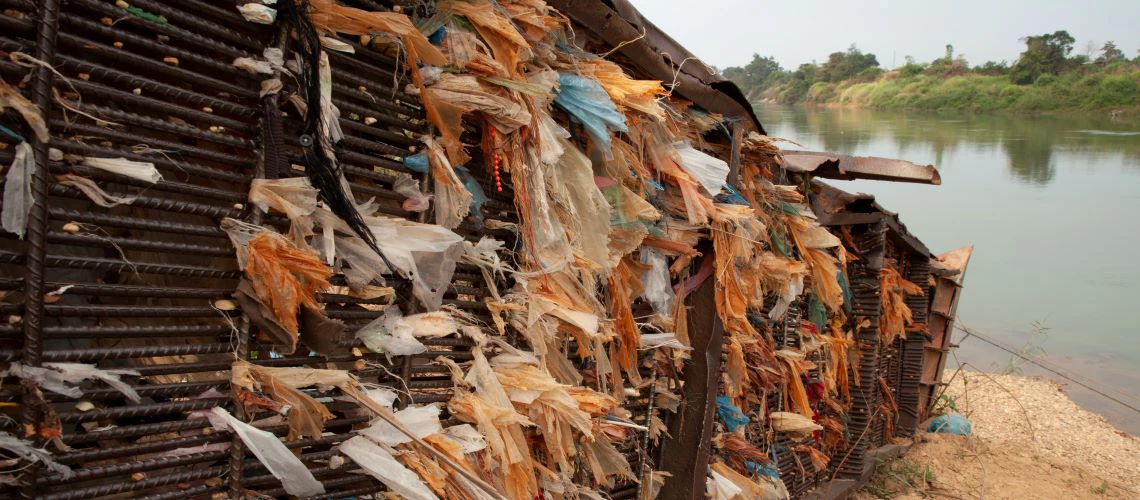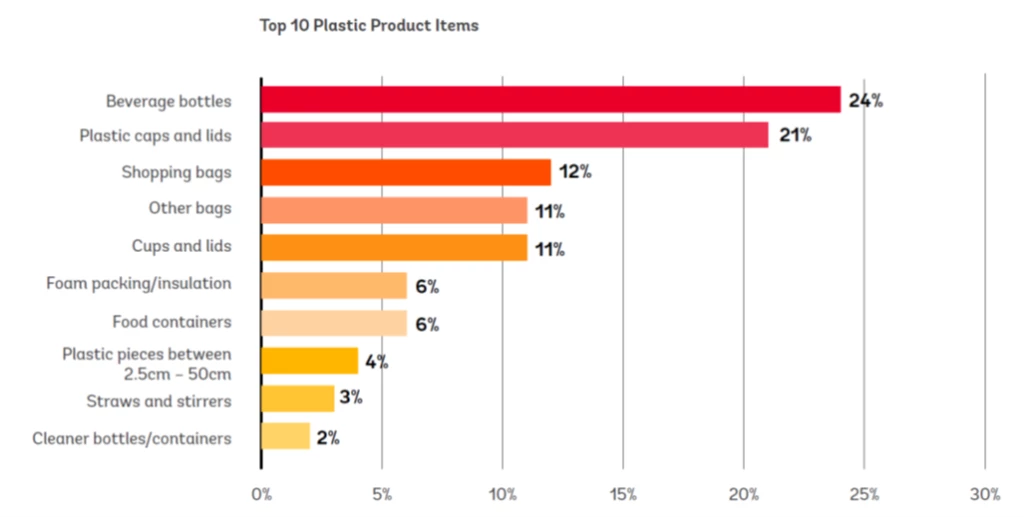 Plastic trapped in an abandoned structure on the Mekong River, Laos
Plastic trapped in an abandoned structure on the Mekong River, Laos
Over the past 20 years, Lao PDR has had one of the fastest growing economies in East Asia and the Pacific. Rapid economic growth has led to a huge increase in waste produced, but systems for dealing with this have not kept pace. Rapid urbanization and changing lifestyles have led to a doubling of waste over the past 20 years in some areas. This has short- and long-term health and economic implications.
What kind of waste is development bringing?
As much as 24% of the waste found in Lao cities is plastic. As our new video shows, plastic waste is now found everywhere in the environment, affecting fish catches, blocking drains, causing air pollution and health issues, and decreasing the value of tourism destinations. The increase in single-use plastics due to COVID-19, and the escalating plastic waste imports since 2018, are making the problem worse.
A 2020 World Bank study of six Lao cities found that 95% percent of plastic pollution is caused by only 10 items — all single-use plastics. Single-use food and drink packaging is the top plastic product category, accounting for nearly half of this pollution — the hospitality and tourism sectors have been identified as key contributors.

As Laos does not yet have a specific regulatory framework on waste management, or clearly defined responsibilities, much of this rubbish is not disposed of properly. Waste management is largely limited to urban centers, and even there only 40-60% of waste is collected — and then taken to landfill sites that are mostly poorly managed. Uncollected waste is burned or openly dumped, often into waterways.
This pollution can have devastating effects. A World Bank study published in 2021 found that 10,000 deaths each year in Laos stem from environmental health factors, with almost half these deaths attributable to air pollution. Environmental risks also resulted in more than 100 million days of illness, costing the economy dearly.
What can Laos do?
The Lao government has expressed a commitment to addressing the solid waste and plastics challenge. Its vision for green economic growth, laid out in the National Green Growth Strategy 2030, is centered on reforms that aim to use natural capital sustainably while reducing environmental costs. Environmental degradation will otherwise make it difficult to achieve economic diversification and allow the Lao economy to become more competitive.
The government is developing a National Plastics Action Plan with support from the World Bank and the EU Switch Asia Facility. Laos has also signed the ASEAN Bangkok Declaration on Marine Plastics, and ratified the amended Basel Convention, which focuses on control of transboundary plastics. The policy framework taking shape will complement and help coordinate ongoing community-level efforts around the country to manage plastics.
A new World Bank report, Get CLEAN and GREEN—Solid Waste and Plastic Management in Lao PDR, supported by the Korean Green Growth Trust Fund and PROBLUE, offers recommendations on how to better control solid waste and plastic pollution and is being used by the government as a key input for the National Plastic Action Plan. The report summarizes the findings of plastic and solid waste studies in Laos and assesses different ways of combating plastic pollution. The report is designed as a tool for planning and decision-making to reduce plastic pollution and provides a basis for better solid waste management. Recommendations include:
- Adopt a mix of regulatory and economic instruments, voluntary agreements, and awareness-building activities for plastics management.
- Focus on the top 10 plastic product items, which represent 95% of plastic found in rivers.
- Introduce measures gradually, starting with simple, low-cost actions that have wide political and public support and can be readily monitored and enforced.
- Focus on the hospitality and tourism sectors, where many measures are immediately feasible and impact can be significant.
- Engage the private sector and retail businesses in plastic reduction, collection, and recycling.
To reduce plastic pollution, behavior change will be needed. Consumers and retailers can play key roles in preventing and managing of waste. Regulations can help people with the necessary changes by making it easier for them to identify, separate, reuse and, recycle waste. Retailers can provide environmentally friendly alternatives to plastic food packages, while consumers can bring reusable containers when shopping.
As the Lao economy develops and towns continue to grow, proactive steps are needed to prevent further plastic pollution and ensure sustainable economic development. The World Bank brings continued support to the government’s efforts to reduce plastic pollution and develop the country’s solid waste sector.




Join the Conversation